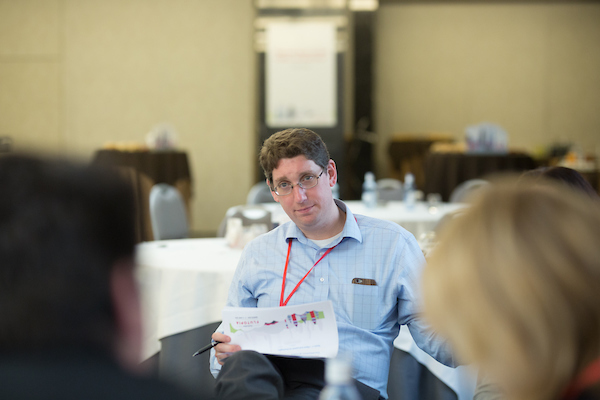#TeamVaccines
Ethan's Story
Vaccines Research
I’m Ethan, and I have dedicated my career to understanding the influenza virus and safeguarding our communities from this potentially life-threatening disease.
I do this by working with my research team to advance influenza protection by building on current science and pursuing new vaccine technologies.
From a very young age, I always wanted to use science to help people. When I was in middle school, a family friend helped discover and develop the first HIV protease inhibitor, which is a class of medicines used for the treatment of HIV. His breakthrough research occurred during the height of the HIV/AIDS crisis and was a testament to how the work of dedicated individuals can save countless lives and have a positive impact on our world. It inspired me to follow in his footsteps and pursue a career in vaccines to help drive meaningful benefits for human health.


Why do we need seasonal influenza vaccines?
Influenza is a potentially serious, contagious respiratory illness that can impact daily life, including work, school and the family. Influenza infection can have serious health consequences for those of any age, including pneumonia, myocarditis, inflammation of the brain and in rare cases, even death. It is especially dangerous for the more vulnerable in our community. Certain people, like children, pregnant women, older adults, individuals with weakened immune systems or certain chronic medical conditions like asthma, diabetes and heart disease are at higher risk for serious flu-related complications [1]. The U.S. Centers for Disease Control and Prevention (CDC) recommends everyone aged six months and older should receive an influenza vaccine annually as the best way to prevent influenza - unless advised not to by a healthcare professional [2].
What can we do to improve our protection against future influenza pandemics?
Another influenza pandemic similar to the Spanish flu in 1918 (which killed between 20-50 million people) remains a cause for concern as the flu virus can cause unpredictable and recurring pandemics. Since 1918, there have been four pandemics caused by an influenza virus, including the 2009 H1N1 pandemic [3].
In the case of an influenza pandemic, we can’t predict what viral strain we’ll be dealing with, or where and when we’ll need to act. However, we can prepare by finding ways to respond quickly when a new viral strain emerges, in order to sequence the new strain and rapidly develop a vaccine to protect against it. Vaccines, along with other countermeasures, are key components of pandemic readiness [4].


What’s next for influenza vaccines?
We’ve seen the impact of messenger RNA (mRNA) vaccine technology in protecting against COVID-19. It’s possible that mRNA technology could be used to help prevent or treat other diseases, including flu, so some companies are currently working to develop new vaccines using mRNA.
Beyond traditional mRNA, the next generation of this technology, self-amplifying messenger RNA (sa-mRNA), is in development for use against seasonal and pandemic influenza. My team has been researching this new technology, along with other innovations, for a number of years.
sa-mRNA provides instructions to not only make a protein but also to amplify the amount of protein made [5]. This means sa-mRNA can create more protein, increasing the body’s ability to fight the influenza virus [6].
sa-mRNA also enables manufacturers to develop vaccines within a shorter timeframe because of the versatility of the technology [7].
To generate new vaccines that may address the challenges that influenza poses, we must continue to harness innovation in influenza vaccine technology. I’m fortunate to work with extremely dedicated scientific professionals who are excited to show up every day and contribute to something that may make a real difference for the betterment of global public health.
Read next storyReferences and further links
- Centers for Disease Control and Prevention (CDC). (2021). People at Higher Risk of Flu Complications
- Centers for Disease Control and Prevention (CDC). (2021). Who Should & Who Should NOT Get Vaccinated
- Centers for Disease Control and Prevention (CDC). (2019). 2009 H1N1 Pandemic
- World Health Organization (WHO). (2022). Epidemic and pandemic-prone diseases
- Vigel, B., Lambert, L., Kinnear, E., et al. (2018). Self-Amplifying RNA Vaccines Give Equivalent Protection against Influenza to mRNA Vaccines but at Much Lower Doses. American Society of Gene & Cell Therapy. 10.1016/j.ymthe.2017.11.017
- Blakney, A. (2021). The next generation of RNA vaccines: self-amplifying RNA. Biochem (Lond). DOI: 10.1042/bio_2021_142
- Ballesteros-Briones, M.C., Silva-Pilipich, N., Herrador-Canete, G., Vanrell, L., Smerdou, C. (2020). A new generation of vaccines based on alphavirus self-amplifying RNA. Curr Opin Virol. DOI: 10.1016/j.coviro.2020.08.003